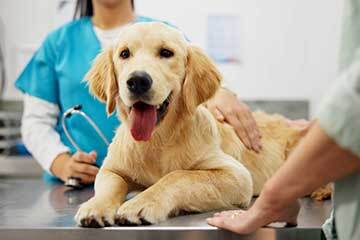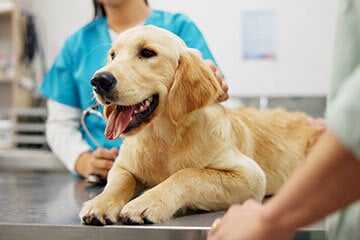If you've ever wondered, "can my dog eat that?" then this guide is for you. We look at what dogs can and can’t eat, and what you should do if your dog eats something they shouldn’t.

Unsupervised pets have left owners paying hundreds of pounds for treatment
Research from Confused.com revealed that almost 1 in 6 (16%) owners didn’t know what items were toxic to their pets.
People feel strongly about this issue. Almost half (46%) think that it’s the responsibility of the owner to educate themselves on what’s dangerous for their pets.
But some people knowingly feed their pets toxic items, and around 2 in 5 (37%) think those who do this should be banned from owning a pet.
There’s no specific law around dogs and toxic foods. But there are codes of practice under the Animal Welfare Act 2006.
Under the act, owners must meet the welfare needs of any animal in their care(1). It could be argued that if you’re intentionally feeding your pet toxic foods, you’re not meeting your animal’s welfare needs.
That means you could be prosecuted under the Act, face a ban from owning animals and potentially serve a prison sentence.
Here are the different foods (both toxic and non toxic) that owners are knowingly feeding to their dogs:
| Food | % of owners |
|---|---|
|
Cheese
|
50%
|
|
Milk
|
27%
|
|
Raw meat
|
29%
|
|
Yoghurt
|
23%
|
|
Peanut butter
|
23%
|
|
Cooked bones
|
17%
|
|
Sweetcorn
|
13%
|
|
Raw eggs
|
14%
|
|
Chocolate
|
10%
|
|
Bread dough
|
9%
|
|
Grapes
|
7%
|
|
Citrus fruits
|
6%
|
|
Blue cheese
|
5%
|
|
Avocado
|
5%
|
|
Coconut
|
5%
|
|
Raisins
|
4%
|
|
Onion
|
4%
|
|
Garlic
|
4%
|
Chocolate (12%) was the most common food that pets accidentally ate. Around 1 in 5 (18%) dogs had chocolate without their owners knowing.
Owners experienced their pets experiencing symptoms such as vomiting (19%), diarrhoea (17%) and loss of appetite (9%) after they accidentally ate these foods.
A quarter (26%) of pets had to go to the vets, the most common form of treatment for this was drips/fluids (34%).
Other treatments included blood tests (32%) and being monitored overnight (31%). Sometimes pets had to have an ultrasound (22%).
In total, pet owners said treatment cost them around £295, on average.
But some people (69%) decided not to take their pets to the vet. The majority said this was because their pets showed no symptoms (61%).
And almost a third (29%) said their pets had eaten the item before and were fine.
But this is a risky approach. Leaving your pet could be fatal so you should always check in with your vet if your pet has eaten something they shouldn’t have.
For pets who accidentally consumed items, such as chocolate, owners say that they were able to claim back £338, on average from their pet insurance.
What can dogs eat?
Dogs can eat these foods in moderation:
-
Apples
-
Banana
-
Strawberries
-
Coreless pears
-
Blackberries
-
Blueberries
-
Watermelon
-
Kiwis
-
Fresh and dried cranberries
-
Cooked eggs
-
Peanut butter that’s 100% peanuts - make sure it doesn’t contain xylitol, this can be fatal to dogs
What can’t dogs eat?
Your dog can’t eat these things:
-
Chocolate
-
Onions, garlic and chives
-
Corn on the cob
-
Macadamia nuts
-
Avocado
-
Artificial sweeteners
-
Cooked bones
-
Alcohol
-
Grapes and raisins
-
Lemon or lime
-
Raw yeast dough
-
Coffee and tea
-
Anything that’s really salty
Can my dog have dairy products?
Some trainers often use cheese to train dogs, and for some it’s really effective. You can also use natural yoghurt to make healthy snacks for your dog.
But if your dog is lactose intolerant, it’s not a good idea to feed them dairy. It can cause stomach upset, vomiting and sometimes skin conditions if their systems don’t respond well to dairy.
Can you give dogs paracetamol?
According to Dogs Trust, it's potentially dangerous to give your dog a paracetamol. Sometimes, human medications are prescribed to your dog by the vet, but you should never give paracetamol to your dog without consulting a vet first.
Paracetamol can be poisonous to canines, particularly in high doses. After all, it's a pain relief drug that is designed for humans, not for dogs.
If your dog is suffering from pain, you should take them to the vet and for proper diagnosis and treatment.
Why do dogs eat grass?
If you catch your dog eating grass, don’t worry. Dogs often do it. There are several theories why they do, such as:
-
Improving digestion
-
nutrition they’re not getting elsewhere, such as fibre
-
Enjoying the taste and texture
-
Wanting to vomit when they’re unwell, because vomiting helps them feel better
In most cases, your dog occasionally eating grass isn’t too much of a cause for concern. If you suspect it’s related to their diet or if they’re getting regularly sick from eating grass, speak to your vet.
If you think it’s boredom-related, find some new ways to engage them. For example, throwing treats on the ground for them to search for or toy based games.
One final point. Your dog could get seriously ill if the grass they eat has been treated, so be sure to keep a careful eye on them if they’ve taken an interest in eating grass.
Faith Tagg, pet insurance expert at Confused.com comments:
"Owners might be buying chocolate ready for Christmas. But some of these can make your dog very unwell. And a trip to the vet could result in expensive vet bills amounting to nearly £300, on average, as a result.
“If you do need to take your pet to the vet after they’ve consumed something potentially harmful, there are some things you can do:
-
Call your vet right away - they can usually offer advice over the phone or direct you to the nearest vet practice for emergency appointments, if needed.
-
Make a note of the foods or items your pet ate - this helps the vet determine the ingredients your pet’s digested and work out what to do.
-
Inform the vet of any other important information - if you can, knowing things like how much time has passed or if your pet has had a reaction before can be useful to the vet.
“If your pet does need treatment, having a robust pet insurance policy can help cover the costs. Veterinary care can be expensive, but having insurance protection means you can be safe in the knowledge that your pet is being treated properly."
Compare pet insurance quotes
Methodology
Unless otherwise stated, all research was carried out by OnePoll on behalf of Confused.com. A survey of 2,000 UK pet owners was conducted between 13 and 17 March 2024.
https://www.gov.uk/guidance/animal-welfare-legislation-protecting-pets







